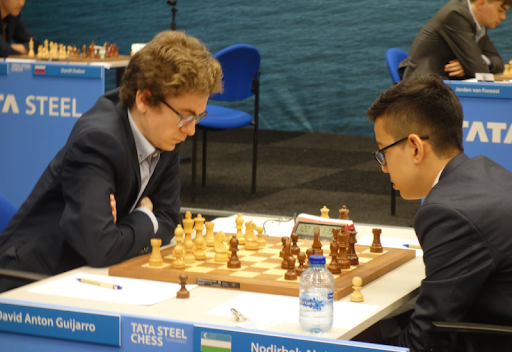Choosing the right chess tournament is a lot like picking a pizza shop. Every chess tournament format has its own unique flavor—some tournaments are as fast as a quick slice, while others are a slow-bake, letting you savor every move. If you’re new to competitive chess or just looking to understand the types of chess tournaments out there, this guide will break down the key formats, their pros and cons, and how to prepare for them. Ready to dive in?
Overview of a Chess Tournament Format
Chess tournaments vary significantly in terms of structure, scoring, and overall experience, catering to different levels of competition. The main formats include:
- Swiss System: Players are paired with others who have similar scores in each round, offering a balanced competition. This format is widely used in open tournaments.
- Round Robin: Each player competes against every other participant, ensuring everyone faces the same number of opponents.
- Quad Tournaments: Players are divided into small groups of four and compete within their group, making it more intimate and competitive.
- Knockout: Players are eliminated after a loss, which adds intensity and pressure to each match.
- Match Competitions: One-on-one competitions, often seen in world championship settings, where players compete over multiple games.
Understanding these chess tournament formats is essential for improving your gameplay. Chess tournaments help players develop crucial skills such as time management, decision-making under pressure, and strategic thinking. Competing regularly builds resilience, improves focus, and increases confidence on the board, which is vital for progressing at any level of the game.
Federations like FIDE and national chess bodies ensure tournaments follow standard rules, making it easier for players to adapt to any tournament, whether local or international. This standardization helps players seamlessly transition between different competition levels.
For those eager to practice and excel in these various formats, Caissa School of Chess offers an online platform where players can practice against human-like bots across all FIDE-rated levels. This allows participants to familiarize themselves with different tournament styles, from the strategic intricacies of Swiss tournaments to the fast-paced action of Blitz games, ensuring they master multiple formats and enhance their competitive edge.
Swiss System Tournaments: Where Strategy Meets Opportunity
The Swiss System is one of the most popular formats, especially in larger tournaments. Unlike a simple knockout system, the Swiss ensures that no one is eliminated after a single loss.
Mechanics of Player Pairing Based on Ratings
Players are paired with others who have a similar score after each round, making the competition more balanced as the event progresses. This system is ideal for events with large numbers of participants because it can accommodate a wide range of skill levels.
For example, if you win your first round, you’ll likely face a tougher opponent in the second. Conversely, a loss might match you against someone closer to your skill level. The pairing process ensures that players remain engaged throughout the tournament, regardless of their performance.
Advantages of Accommodating Large Player Numbers
One of the major advantages of the Swiss System is its ability to manage large fields of players without needing a lengthy event duration. A typical Swiss tournament chess format might have anywhere from 5 to 9 rounds, making it possible to determine a winner without every participant playing against every other competitor. This makes it a common choice for both local weekend events and larger open tournaments.
Scoring System: Win = 1 point, Draw = 0.5 points, Loss = 0 points
Scoring in a Swiss System is straightforward: 1 point for a win, 0.5 for a draw, and 0 points for a loss. This simple system allows players to quickly track their standing throughout the event.
Common Strategies and Their Risks, Like the Swiss Gambit
Some players adopt a strategy known as the Swiss Gambit—intentionally losing or drawing early rounds to face easier opponents in the middle rounds. This can be risky, as players might find themselves too far behind to catch up to the leaders. But when it works, it allows a player to finish strongly by gaining points in the later rounds. Whether this strategy is right for you depends on your style and the competitiveness of the tournament.
Caissa School of Chess helps players prepare for the pairing dynamics of Swiss tournaments by offering insights into game analysis and optimal strategies to face opponents of varying skill levels. It’s a great way to simulate tournament conditions and adapt to different challenges.
Round Robin Tournaments: Everyone Gets a Shot
In a Round Robin tournament, every player competes against each other, ensuring that the competition is thorough.
Structure Where Each Player Competes Against Every Other Player
This chess tournament format is often used in elite competitions like the Candidates Tournament, where the goal is to identify the best player from a select group.
For example, if there are 10 players, each will play 9 games, one against every other participant. The player with the highest score at the end of all rounds is declared the winner.
Benefits of Accurately Judging Player Performance
The main advantage of a Round Robin format is its fairness—because everyone plays against each other, it’s an accurate way to judge who is truly the best. It’s an ideal format when there is a small number of players and you want to ensure that luck and pairings don’t play too big of a role in determining the winner.
Drawbacks Regarding Time and Cost
However, Round Robin tournaments can be time-consuming and costly to organize, especially with larger groups. This format requires every player to stay until all rounds are completed, which might not be practical for casual players or weekend events.
Quad Tournaments: Compact and Competitive
A Quad Tournament is essentially a mini Round Robin. Players are divided into groups of four, where each participant plays three games—one against each of the others in their group.
Focuses on Players of Equal Skill Levels to Avoid Mismatches
The appeal of Quad Tournaments lies in their focus on matching players of similar skill levels. This means less likelihood of mismatches and a more competitive experience for all involved. They are often used in local clubs and leagues as a way to provide a focused, competitive environment.
Knockout Tournaments: Survival of the Fittest
In a Knockout chess tournament format, players face off one-on-one, with the winner advancing to the next round and the loser being eliminated. This continues until a final match determines the champion. It’s a format that brings out the intensity of every game, as each match is a do-or-die situation.
Organizational Structure and Common Use Cases
Knockout tournaments are common in prestigious events like the FIDE World Cup and are also used in national and regional competitions. They’re thrilling to watch because of the high stakes, but they can be stressful for players who know that a single mistake could send them home.
Match Competitions: One-on-One Chess Showdowns
Match Competitions involve two players facing each other across several games—often 6, 12, or even more, depending on the event. The goal is to accumulate more points than your opponent across all the games, making it a test of consistency and endurance.
Usage in Determining Stronger Players, Especially in World Championships
This format is most famously used in World Chess Championships, where the world’s best players compete in extended matches to determine the titleholder. The one-on-one structure allows players to delve deeply into their opponent’s style, making it a true battle of wits.
The personal chess buddies, a part of the Caissa School of Chess, can guide you through the specific rules and strategies of each format, ensuring that you’re fully prepared before stepping into any competitive environment. Whether it’s understanding the complex strategies of Swiss-system events or fine-tuning your game for intense one-on-one matchups, Caissa’s interactive platform is designed to help you excel.
Tournament Preparation and Participation: Get Ready to Compete!
Understanding the rules of the tournament format you are entering is crucial. For example, Swiss System tournaments might require specific knowledge about pairing rules, while Knockouts demand a focus on winning each individual game. Knowing what to expect helps you adapt your strategies accordingly.
Tips for Personal Preparation: Avoiding Learning New Openings Last Minute
Preparation is key for tournament success. Focus on solidifying your existing repertoire instead of experimenting with new openings right before the event. Study your opponents if possible, and ensure you are comfortable with the time control.
Practicing Tactics and Reviewing Games for Improvement
Use platforms like CircleChess or Chess.com to practice tactics and analyze previous games. Reviewing your own matches can help you understand what went wrong and identify patterns in your play.
Wrapping Up: Choosing the Right Chess Tournament for You
The types of chess tournaments vary widely, each offering unique challenges and experiences. Whether you prefer the balanced approach of a Swiss System, the all-in nature of a Knockout, or the intense one-on-one battles of a Match Competition, there’s a format for every kind of player.
Want to refine your tournament strategy and climb the chess ladder? Join Caissa School of Chess for personalized training, expert guidance, and tools to track your progress across different tournament formats.
Ready to test your skills? Which format suits your style the most—Swiss, Round Robin, or Knockout? Share your thoughts and find your next tournament challenge!





